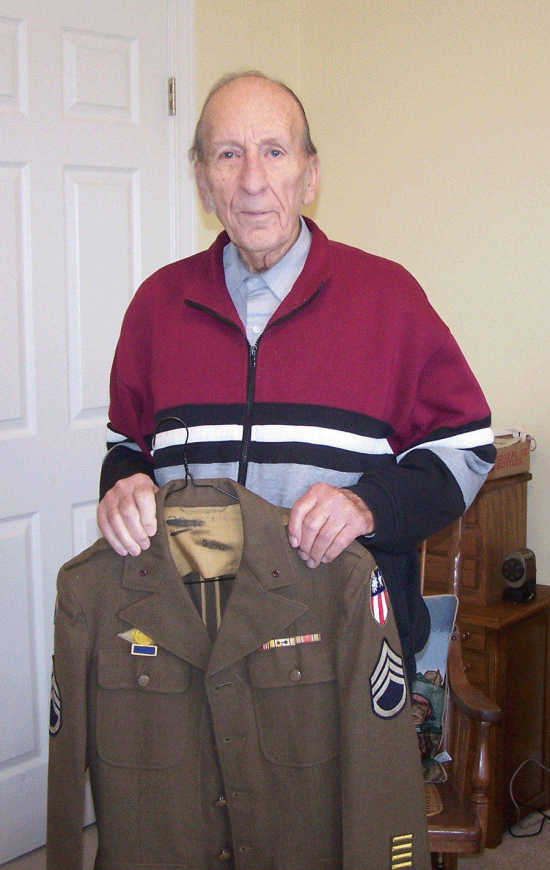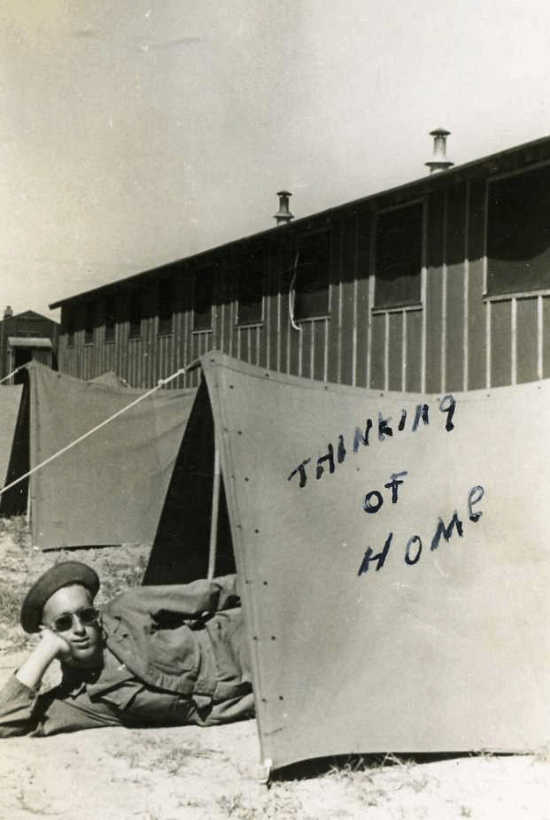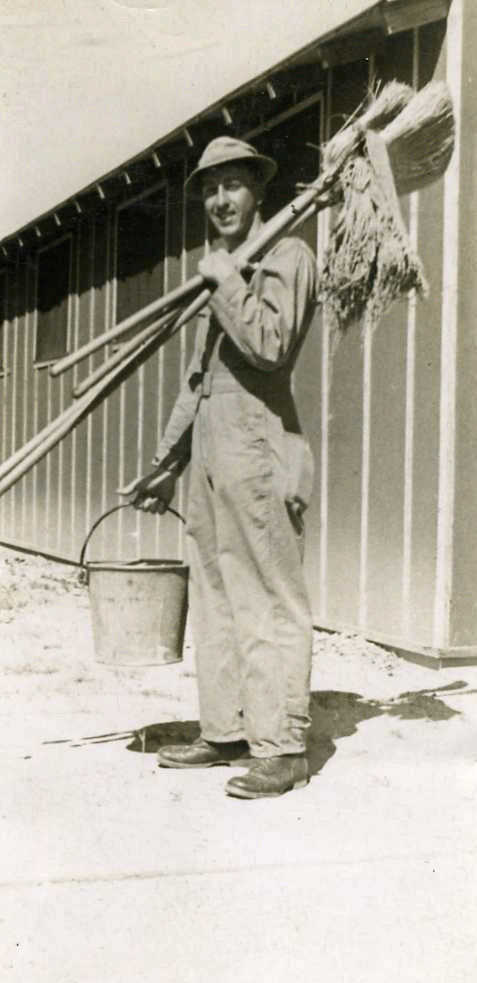'The most wonderful sight was the Statue of Liberty': John Nichols recalls service during World War II

John Nichols was a senior in high school in 1942. He lived on a small farm close to Ft. Knox and started work at a concrete lab which poured all the concrete for Ft. Knox. He and a neighbor boy hitchhiked to town to see the Wizard of Oz. After the movie, they were waiting for a ride at the local filling station and were told about Pearl Harbor being attacked and our country was at war. He didn't have to go into the service because he was already in a defense job, but he resigned and volunteered.
He entered the armed services in January 1943. He was sent to Shepherd Field at Wichita Falls, Texas, for three months of basic infantry training. He was transferred into the Air Force. He didn't choose, they chose for him. He was sent to Spokane, Wash, for a month of training in chemical warfare. After graduation, he received the rank of corporal. He was sent on a train back to Casper, Wyo., where he trained his own outfit and other troops in chemical warfare. He was made sergeant, and was supposed to advance even more, but all ratings were frozen after that and there were no more advancements.
After training his outfit, he left on a troop train from Casper to Los Angeles where at the proper time; he was put on the USS Uruguay where they sailed to Hobart, Tasmania, an island off the coast of Australia, on to Fremantle, Australia, Africa and Bombay, India. They were on the ship for 53 days, all the while staying close to friendly countries as possible. From that ship, they got on a British ship and went to what is now Pakistan. They boarded a narrow gauge train at Karachi, India, and rode for two weeks on the train to Chabua. They sat up on wooden benches and would lean over on their duffle bag to sleep when they got any sleep. The train would stop and all would get off and go to the mess car to eat -- what food there was, and it wasn't very good. He spent 2 1/2 years there as a Transportation Technician.

His air base provided supplies "over the hump" to China in the fight. His job was to check the planes to see that the cargo was loaded properly and balanced and tied down.
They were in an importation position at the beginning of the Burma Road. Some spies infiltrated their camp and they gathered troops and tried to take over the base. Nichols said, "With India's guard and our Air Force, we kept them out."
Nichols said he was not in real combat territory. "I was shot at, but never had to shoot anybody. I was always thankful for that. We were shot at, but not in the hand-to-hand combat."

One of his major combats was with the giant mosquitoes and large jungle insects. "I always said the mosquitoes were so big, they'd fly down and turn over your dog tag to see what kind of blood you had!" Nichols said that most of the troops had malaria, but he didn't. He tucked his pants into his boots, sprayed with disinfectant, and slept under the mosquito netting -- all the things he was supposed to do.
The only source of American music that he heard the whole time he was there was by Tokyo Rose. It was meant to disillusion the troops and make them feel homesick, but it had the opposite effect on him and made him determined to do his part to win the war.
"It was hot -- 120 to 130 degrees because it was close to the equator. It was real humid and the only break we got was during the monsoons. Then we had rain, rain, rain, and floods and mudslides."
Not only did Nichols have to endure heat, mosquitoes, being in danger and far away from home, there were two earthquakes while he was there. One was at night. He woke up and his bunk was jumping up and down. They thought they were being bombed and some people jumped out the windows of the tent. The other quake was during the day. He had his hand on a brick building and was leaning against it. It started going up and down. He said the building was the mess hall and he heard dishes crash, but no real damage.
On D-Day, he was on the Burma Road where he went in a plane to get wounded soldiers. After the war was over, he had to wait until December to get back. It was a major transportation event to get all the hundreds of thousands of troops returned home.
The vehicles headed for home were done on the numbers system -- how long you had been in, married or with children. He wasn't married and just overseas duty was on his points system. While he was waiting, he and a friend hopped an old plane and went to Karachi. The base was in one of the greatest tea growing fields in the world, but he hadn't had any Coke, ice cream or even hamburger for almost three years. That day, he ate 11 banana splits!
Consequently, he didn't feel to well the next day.
When it came time to load out, the Air Force sent in two old C47 and C46 cargo planes. He could have been on the first plane, but chose to wait for the second. His last official duty was to order, "Load the planes." The first plane crashed and killed all troops aboard. "That was another time I could have been killed if the Lord had not had plans for me," Nichols said.
They stopped in Agra, India to see the Taj Mahal, the white marble mausoleum completed in 1648 and regarded as one of the eight wonders of the world. He said it was beautiful.
His next stop was at Tent City in Karachi, India. There was no electricity where the service people were waiting for ship assignment.
He had arrived and was walking with some friends to his bunk when a native shouted, "Cobra" and pointed to his tent. They searched and there, coiled around his bunk was a deadly cobra. This was another time that he would have died had God not intervened.
They were loaded onto the ship General M. C. Meigs and went across the Red Sea, Mediterranean and to the Atlantic Ocean where they hit one of the worst storms in more than 50 years.
"The ship was tossed like a cork in the water. We had to tie ourselves in our bunk. If we went anywhere, we had to crawl. Once, I crawled from the bottom deck to the third deck and looked up -- the ocean was above me!"
The storm lasted for three days. The ship with 5,000 personnel came close to sinking.
When he sailed into New York Harbor, "The most wonderful sight was the Statue of Liberty. Then I actually knew I was home." The Red Cross gave them doughnuts and coffee and they took a ferry to New Jersey where they were welcomed, given instructions and sent back to Camp Atterberry from which he had left. He had been completely around the world. He spent three birthdays, two Christmases and three Thanksgivings overseas. He was discharged Dec. 8, 1945. He took the train home to Louisville, Ky., and on local buses and trains until he got home at 2 a.m.
Such was his mother's love that since her son couldn't have ice cream, Coke, or hamburgers, she never ate any the whole time he was gone. Nichols will never forget her reaction when he arrived home for the happy reunion.
When Nichols left for the service, he weighed 170 pounds, but when he returned, he only weighed 129 pounds. He said, "I left a civilian and I came home a civilian. I never got to come home on any leave and I never spoke with any member of my family all that time until I got back to the States."
At Kohina where the Japanese troops were turned back in their invasion of India a memorial reads: "When you go home, Tell them of us and say -- For their tomorrow,We gave our today."
John Nichols gave almost three years of his days.

Back in Kentucky, John met a young woman named Katie who worked at the Post Engineer Office in Fort Knox. On Jan. 24, 1947, they were married. In 1948, he began attending Georgetown Baptist College and started supply preaching in churches in Kentucky. Jan. 4, 1957, they moved to Nevada, Mo., where he had been called to preach at the Calvary Baptist Church. He continued in this position until 1962 when he became the director of Missions for the Nevada Baptist Association and retired 25 years later. They have three children, Carol, Jim, and John. The first wedding that he performed was for Ron and Joan Jones. He attended their 50th wedding anniversary. He probably holds some sort of record for conducting funerals --more than 1,500.
